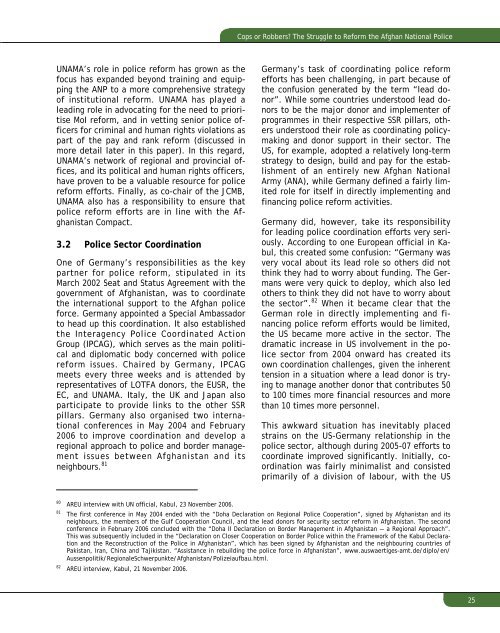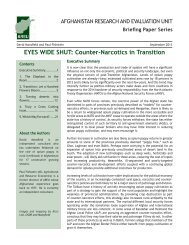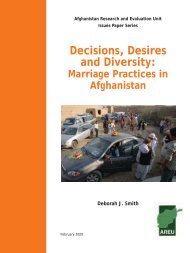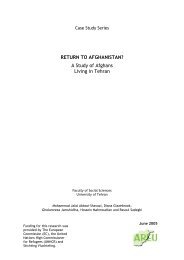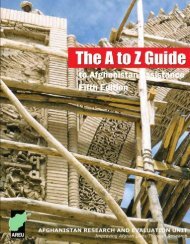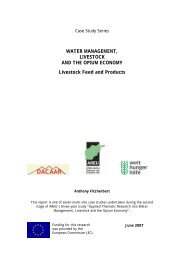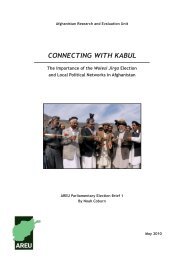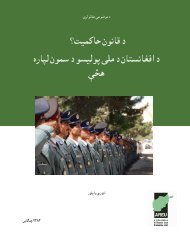Cops or Robbers? The Struggle to Reform the Afghan National Police
Cops or Robbers? The Struggle to Reform the Afghan National Police
Cops or Robbers? The Struggle to Reform the Afghan National Police
Create successful ePaper yourself
Turn your PDF publications into a flip-book with our unique Google optimized e-Paper software.
<strong>Cops</strong> <strong>or</strong> <strong>Robbers</strong>? <strong>The</strong> <strong>Struggle</strong> <strong>to</strong> Ref<strong>or</strong>m <strong>the</strong> <strong>Afghan</strong> <strong>National</strong> <strong>Police</strong><br />
UNAMA’s role in police ref<strong>or</strong>m has grown as <strong>the</strong><br />
focus has expanded beyond training and equipping<br />
<strong>the</strong> ANP <strong>to</strong> a m<strong>or</strong>e comprehensive strategy<br />
of institutional ref<strong>or</strong>m. UNAMA has played a<br />
leading role in advocating f<strong>or</strong> <strong>the</strong> need <strong>to</strong> pri<strong>or</strong>itise<br />
MoI ref<strong>or</strong>m, and in vetting seni<strong>or</strong> police officers<br />
f<strong>or</strong> criminal and human rights violations as<br />
part of <strong>the</strong> pay and rank ref<strong>or</strong>m (discussed in<br />
m<strong>or</strong>e detail later in this paper). In this regard,<br />
UNAMA’s netw<strong>or</strong>k of regional and provincial offices,<br />
and its political and human rights officers,<br />
have proven <strong>to</strong> be a valuable resource f<strong>or</strong> police<br />
ref<strong>or</strong>m eff<strong>or</strong>ts. Finally, as co-chair of <strong>the</strong> JCMB,<br />
UNAMA also has a responsibility <strong>to</strong> ensure that<br />
police ref<strong>or</strong>m eff<strong>or</strong>ts are in line with <strong>the</strong> <strong>Afghan</strong>istan<br />
Compact.<br />
3.2 <strong>Police</strong> Sect<strong>or</strong> Co<strong>or</strong>dination<br />
One of Germany’s responsibilities as <strong>the</strong> key<br />
partner f<strong>or</strong> police ref<strong>or</strong>m, stipulated in its<br />
March 2002 Seat and Status Agreement with <strong>the</strong><br />
government of <strong>Afghan</strong>istan, was <strong>to</strong> co<strong>or</strong>dinate<br />
<strong>the</strong> international supp<strong>or</strong>t <strong>to</strong> <strong>the</strong> <strong>Afghan</strong> police<br />
f<strong>or</strong>ce. Germany appointed a Special Ambassad<strong>or</strong><br />
<strong>to</strong> head up this co<strong>or</strong>dination. It also established<br />
<strong>the</strong> Interagency <strong>Police</strong> Co<strong>or</strong>dinated Action<br />
Group (IPCAG), which serves as <strong>the</strong> main political<br />
and diplomatic body concerned with police<br />
ref<strong>or</strong>m issues. Chaired by Germany, IPCAG<br />
meets every three weeks and is attended by<br />
representatives of LOTFA don<strong>or</strong>s, <strong>the</strong> EUSR, <strong>the</strong><br />
EC, and UNAMA. Italy, <strong>the</strong> UK and Japan also<br />
participate <strong>to</strong> provide links <strong>to</strong> <strong>the</strong> o<strong>the</strong>r SSR<br />
pillars. Germany also <strong>or</strong>ganised two international<br />
conferences in May 2004 and February<br />
2006 <strong>to</strong> improve co<strong>or</strong>dination and develop a<br />
regional approach <strong>to</strong> police and b<strong>or</strong>der management<br />
issues between <strong>Afghan</strong>istan and its<br />
neighbours. 81<br />
Germany’s task of co<strong>or</strong>dinating police ref<strong>or</strong>m<br />
eff<strong>or</strong>ts has been challenging, in part because of<br />
<strong>the</strong> confusion generated by <strong>the</strong> term “lead don<strong>or</strong>”.<br />
While some countries unders<strong>to</strong>od lead don<strong>or</strong>s<br />
<strong>to</strong> be <strong>the</strong> maj<strong>or</strong> don<strong>or</strong> and implementer of<br />
programmes in <strong>the</strong>ir respective SSR pillars, o<strong>the</strong>rs<br />
unders<strong>to</strong>od <strong>the</strong>ir role as co<strong>or</strong>dinating policymaking<br />
and don<strong>or</strong> supp<strong>or</strong>t in <strong>the</strong>ir sect<strong>or</strong>. <strong>The</strong><br />
US, f<strong>or</strong> example, adopted a relatively long-term<br />
strategy <strong>to</strong> design, build and pay f<strong>or</strong> <strong>the</strong> establishment<br />
of an entirely new <strong>Afghan</strong> <strong>National</strong><br />
Army (ANA), while Germany defined a fairly limited<br />
role f<strong>or</strong> itself in directly implementing and<br />
financing police ref<strong>or</strong>m activities.<br />
Germany did, however, take its responsibility<br />
f<strong>or</strong> leading police co<strong>or</strong>dination eff<strong>or</strong>ts very seriously.<br />
Acc<strong>or</strong>ding <strong>to</strong> one European official in Kabul,<br />
this created some confusion: “Germany was<br />
very vocal about its lead role so o<strong>the</strong>rs did not<br />
think <strong>the</strong>y had <strong>to</strong> w<strong>or</strong>ry about funding. <strong>The</strong> Germans<br />
were very quick <strong>to</strong> deploy, which also led<br />
o<strong>the</strong>rs <strong>to</strong> think <strong>the</strong>y did not have <strong>to</strong> w<strong>or</strong>ry about<br />
<strong>the</strong> sect<strong>or</strong>”. 82 When it became clear that <strong>the</strong><br />
German role in directly implementing and financing<br />
police ref<strong>or</strong>m eff<strong>or</strong>ts would be limited,<br />
<strong>the</strong> US became m<strong>or</strong>e active in <strong>the</strong> sect<strong>or</strong>. <strong>The</strong><br />
dramatic increase in US involvement in <strong>the</strong> police<br />
sect<strong>or</strong> from 2004 onward has created its<br />
own co<strong>or</strong>dination challenges, given <strong>the</strong> inherent<br />
tension in a situation where a lead don<strong>or</strong> is trying<br />
<strong>to</strong> manage ano<strong>the</strong>r don<strong>or</strong> that contributes 50<br />
<strong>to</strong> 100 times m<strong>or</strong>e financial resources and m<strong>or</strong>e<br />
than 10 times m<strong>or</strong>e personnel.<br />
This awkward situation has inevitably placed<br />
strains on <strong>the</strong> US-Germany relationship in <strong>the</strong><br />
police sect<strong>or</strong>, although during 2005-07 eff<strong>or</strong>ts <strong>to</strong><br />
co<strong>or</strong>dinate improved significantly. Initially, co<strong>or</strong>dination<br />
was fairly minimalist and consisted<br />
primarily of a division of labour, with <strong>the</strong> US<br />
80<br />
81<br />
82<br />
AREU interview with UN official, Kabul, 23 November 2006.<br />
<strong>The</strong> first conference in May 2004 ended with <strong>the</strong> “Doha Declaration on Regional <strong>Police</strong> Cooperation”, signed by <strong>Afghan</strong>istan and its<br />
neighbours, <strong>the</strong> members of <strong>the</strong> Gulf Cooperation Council, and <strong>the</strong> lead don<strong>or</strong>s f<strong>or</strong> security sect<strong>or</strong> ref<strong>or</strong>m in <strong>Afghan</strong>istan. <strong>The</strong> second<br />
conference in February 2006 concluded with <strong>the</strong> “Doha II Declaration on B<strong>or</strong>der Management in <strong>Afghan</strong>istan — a Regional Approach”.<br />
This was subsequently included in <strong>the</strong> “Declaration on Closer Cooperation on B<strong>or</strong>der <strong>Police</strong> within <strong>the</strong> Framew<strong>or</strong>k of <strong>the</strong> Kabul Declaration<br />
and <strong>the</strong> Reconstruction of <strong>the</strong> <strong>Police</strong> in <strong>Afghan</strong>istan”, which has been signed by <strong>Afghan</strong>istan and <strong>the</strong> neighbouring countries of<br />
Pakistan, Iran, China and Tajikistan. “Assistance in rebuilding <strong>the</strong> police f<strong>or</strong>ce in <strong>Afghan</strong>istan”, www.auswaertiges-amt.de/diplo/en/<br />
Aussenpolitik/RegionaleSchwerpunkte/<strong>Afghan</strong>istan/Polizeiaufbau.html.<br />
AREU interview, Kabul, 21 November 2006.<br />
25


